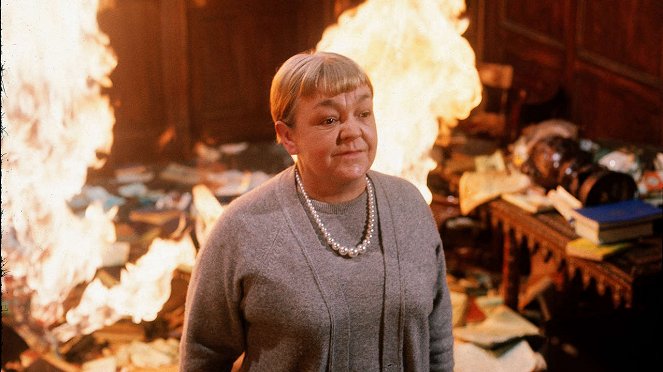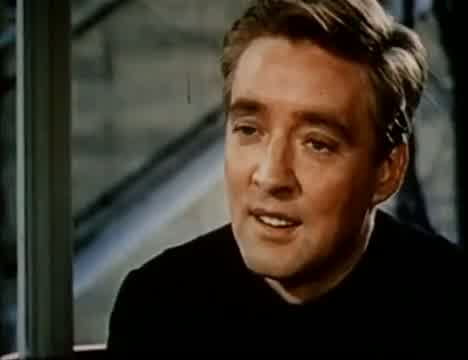Ohjaus:
François TruffautKuvaus:
Nicolas RoegSävellys:
Bernard HerrmannNäyttelijät:
Oskar Werner, Julie Christie, Cyril Cusack, Anton Diffring, Ann Bell, Mark Lester, Eric Mason, Denis Gilmore, Michael Balfour, David Glover (lisää)Juonikuvaukset(1)
Fahrenheit 451 sijoittuu lähitulevaisuuteen, jossa ihmismieliä hallitaan rauhoittavilla lääkkeillä ja tv:n aivottomilla saippuaoopperoilla. Palomiesten tehtävänä ei enää ole tulipalojen sammuttaminen vaan niiden sytyttäminen. Vastarintaa pelkäävä hallitus on kieltänyt kirjallisuuden ja uppiniskaisten kansalaisten kätkemät kirjat poltetaan tuhkaksi. Palomies Montag (Oscar Werner, Jules ja Jim – Rakkauden hymy) tekee työtään turhia kyselemättä, kunnes hän kohtaa Clarissan (Oscar-voittaja Julie Christie kaksoisroolissa), joka saa hänet ajattelemaan toisin. tutustuessaan kirjojen kansien väliin kätkeytyviin kiellettyihin maailmoihin Montag asettaa oman henkensä alttiiksi. (Future film)
(lisää)Videot (1)
Arvostelut (8)
What I’ve always liked the most about dystopia is the helpless and hopeless situation of the characters who try to stand up to the system. Those ingredients are present, so satisfaction. My only problem is that I can’t fully understand why this society would protect their power this way and through these means, and the tactics of the resistance (the book people) are questionable to say the least.
()
Fahrenheit 451 is nothing more or less than a dignified adaptation of Ray Bradbury's famous novel. I remember that, for example, Mel Gibson toyed with the idea of a remake repeatedly, and he certainly was not alone. You can sprinkle in a few million dollars, and add a series of special effects, but without a fundamental revision of the original text, there is nothing to be done with this work. I have no problem with Truffaut; in fact, I would say that his traditionally cooler and detached film style fits the story perfectly. However, I do have an issue with the literary source. I find Bradbury's depiction of totalitarianism unconvincing and the rebellion against the system naive. Bradbury created his work at a time when television gained a dominant position in the field of information distribution, and light television entertainment quickly overwhelmed the naively conceived idea of "elevating" the masses through television broadcasts of operas and educational documentaries. Bradbury seemed to think that higher culture would succumb to the battle against superficial pop culture, and the demise of culture would lead to the establishment of a totalitarian system. However, this allegory has several flaws. Books are not a stronghold of higher culture; they are merely a medium that can have various content and quality, just like a film or a television program. Except for the insane experiment of the Khmer Rouge, who took away much more from the people and essentially everything, no one ever thought of destroying books. Instead, they usually succeeded in taming books, often with great success. Bradbury would be shocked by the millions of copies of prominent authors' works and propagandistic writings in many dictatorships. The survival and success of a regime are not so much related to the size of libraries and cultural subsidies, but rather to the (in)ability to satisfy and entertain the population through consumption. The dictatorships in Eastern Europe certainly did not fall because Vaclav Havel's plays were not allowed or Marta Kubišová could not sing; they fell because the population hungry for consumption exchanged them for full shops following the example of Western Europe. The authoritarian system in China successfully survives even with censorship simply because China's economy is booming, and the extremely anti-cultural and intolerant religious system in Saudi Arabia, well-fed by oil, speaks for itself. Truffaut cannot be denied a good hand in choosing the main characters (perhaps I imagined the wife to be more insipid), the impressiveness of some scenes (the internal struggle of the informer), and above all, the atmosphere (the red fire truck ominously racing through the streets). Nevertheless, in the world of cinema today, I can find much more interesting and chilling dystopias. Overall impression: 60%.
()
Sometimes less is more. Truffaut knew this well, which is why the austere architecture and simple visual effects are not a bad thing; on the contrary, they perfectly illustrate the gloomy atmosphere of a uniformed Orwellian society. The unique atmosphere, Truffaut's inventive direction, and Bradbury's book, when things like this combine, the result will be nothing short of a compelling piece of cinema.
()
This was the fourth movie by François Truffaut that I watched and I was hoping it might surprise me a lot. The premise literally suggested it. But while watching, I quite quickly realized that it s more or less all about the premise. After all, the reviewer Enšpígl is right. The movie is quite emotionless. You can’t form a relationship with the characters. And that’s pretty bad, because in a world full of fascists I would need someone to hang onto and hope for the better. I didn’t see anything like that in the 112 minutes of this movie. I just glimpsed into a world that was making me sick. It was just as impersonal as the movie 1984, which introduced a similar premise.
()
Truffaut’s distinctive - wait, why distinctive? - idiosyncratic adaptation of Bradbury’s vision of the present. At least it gives me that feeling; just look around you to see how many people are reading or what they read. Everything is becoming so simplified that we are not far away from a situation when there won’t be any writing anywhere. Not even opening credits (btw, Truffaut did an excellent job of down-to-the-final-detail stylization of a world without a single letter, and the whole atmosphere smacks of “cold austerity". On the other hand we would get rid of those tabloid newspaper headlines with countless exclamation marks after every act of libel. So don’t be surprised that I’m off to create my own 451° Fahrenheit. I’ll start with today’s The Sun (!!), yesterday’s Paparazzi (!!!) and then go over to archive editions of the National Enquirer (!!!!!). So Truffaut didn’t disappoint as filmmaker. But as a person. He let so many wonderful books burn just because of some detestable motion picture. Nobody has a right to do something like that... Not even genius filmmakers. Especially when I have been searching in vain for one for years. You owe me one, François!
()
Kuvagalleria (56)
Kuva © Universal Pictures



Mainos